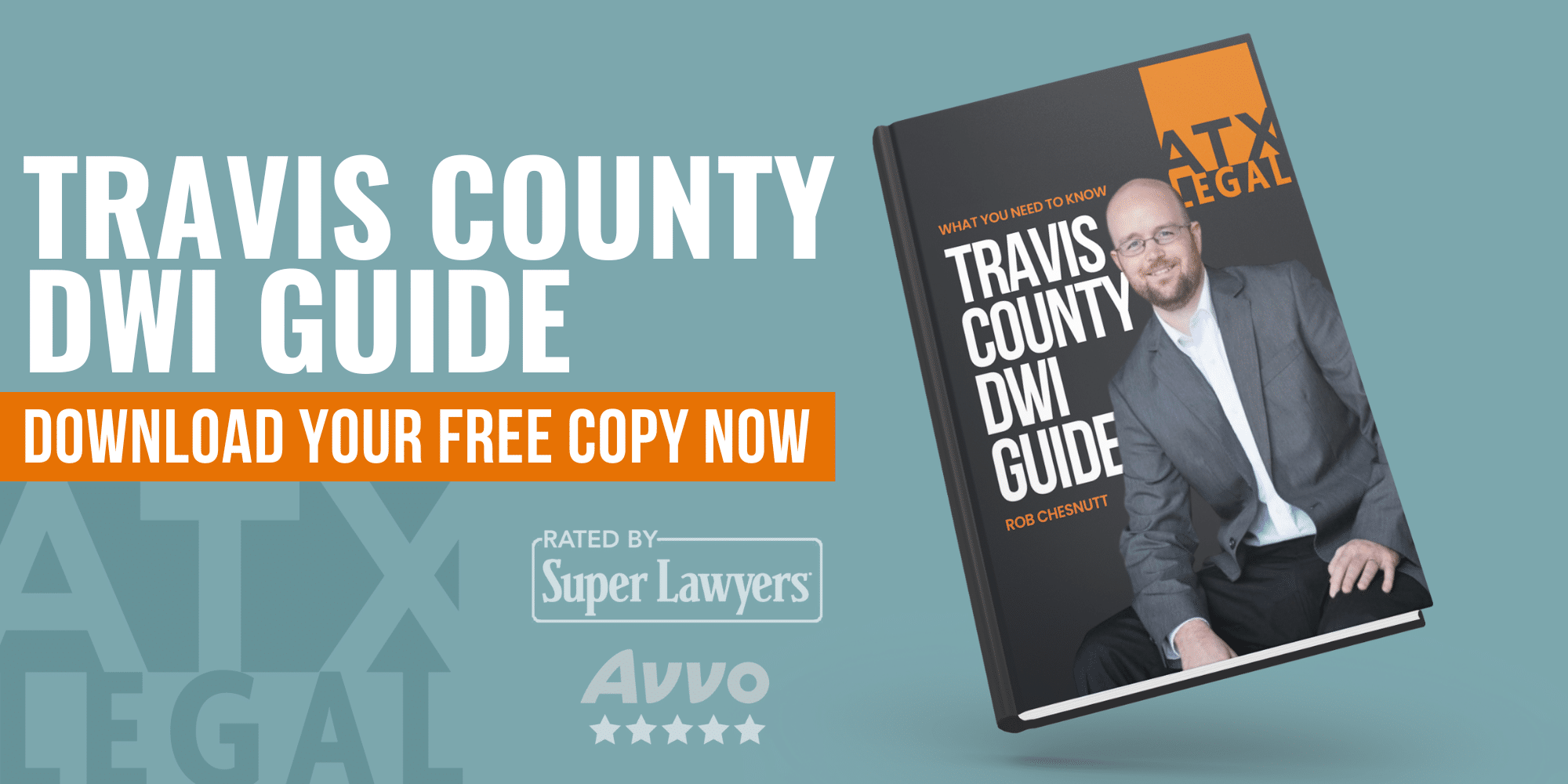What Is the Difference Between DUI and DWI in Texas?
Many states treat DUI and DWI interchangeable, but in the state of Texas, there is a key difference. Driving under the influence (DUI) and driving while intoxicated (DWI) are terms that can cause confusion among drivers. While both refer to the illegal act of operating a motor vehicle while impaired by alcohol or drugs, they are not the same crime.
There are distinct legal differences between DUI and DWI that can have significant implications for anyone caught drunk driving. If you are facing a DWI or DUI charge for driving under the influence in Texas, contact us for a no-cost consultation.
2023 Travis County DWI Guide
Defining DUI vs. DWI
In Texas, DWI stands for Driving While Intoxicated and it means operating a vehicle while intoxicated. This can mean a blood alcohol concentration (BAC) of 0.08% or higher, or the DWI offense could be based on drugged driving, even if you are on a prescription medication.
The term DUI, or Driving Under the Influence, is typically used when a minor (someone under the age of 21) is found driving with any detectable amount of alcohol in their system. This distinction makes it clear that, while both offenses involve impaired driving, the specific charges and potential consequences for the driver can vary greatly. Typically, the penalties of a DUI stay lower, even if the juvenile is convicted (found guilty) of the crime.
Intoxicated or Impaired Operation of Motor Vehicle?
Impaired driving encompasses more than just alcohol intoxication. The use of a controlled substance or drugs can also lead to a DWI charge if a law enforcement officer determines that a driver’s ability to operate a vehicle safely has been compromised. Through field sobriety tests and chemical tests, such as a breathalyzer test or blood testing for drugs, officers assess a driver’s level of impairment at the traffic stop.
DUI vs. DWI: Key Differences
The key differences between DUI and DWI in Texas hinge on the driver’s age, substance involved, and level of impairment. While DUI charges primarily target underage drivers with any alcohol in their system, a DWI refers to charges that can apply to all drivers based on the legal limit of blood alcohol content or evidence of drug impairment.
Impaired Driving Laws by State
Texas’s approach to tackling impaired driving is similar to other states, yet unique laws and penalties exist. For instance, while the legal BAC limit is 0.08% across many states, the penalties and methods for enforcing these laws can vary, affecting everything from car insurance rates to the possibility of license suspension.
If the BAC is over 0.15%, or if you have had a previous conviction for driving drunk, even a first DWI will be charged as a class A misdemeanor.
DUIs and DWIs. Will Drunk Driving Impact My Car Insurance Rates?
Yes, both DUI or DWI convictions can significantly impact car insurance rates. Insurance companies are set by the insurance company with a view that individuals convicted of these offenses as high-risk drivers. This can lead to increased premiums or even policy cancellations. The duration of this impact can extend from a few years to permanently, depending on the insurance company’s policies and the severity of the offense.
Potential Consequences of a DWI or DUI
The potential consequences of a DWI or DUI in Texas are severe and varied. They can include jail time, fines, community service hours, and mandatory attendance in alcohol education programs. Additionally, convicted drivers can face long-term implications such as a DUI conviction or DWI conviction appearing on their driving record, affecting employment opportunities and resulting in higher insurance premiums. Because DUIs are limited to charges vs minors in Texas, these will be handled in juvenile court, except for some rare exceptions. Additionally, a DUI or DWI can impact your driver’s license and your insurance record.
There are especially severe consequences for felony DWIs, such as Safe-P, a 3-4 month in patient program where the defendant is geld in custody, significant jail time, long terms of probation and hefty fines.
How an Attorney Can Help with DUI and DWI Charges
An experienced attorney can provide invaluable assistance to those facing a first DUI or DWI for intoxicated driving. From negotiating with prosecutors to challenging the evidence in court, legal representation can significantly affect the outcome of a case. In some instances, an attorney may even get a DWI charge dismissed, depending on the circumstances surrounding the arrest and the evidence collected. If it is possible, avoiding a DWI conviction is important for your future.
Additionally, a criminal defense attorney can help in other ways. An attorney can challenge the driver’s license suspension to keep you driving while the case is pending. He can limit or eliminate consequences like jail time, fines, or community service. In some cases, he can have a more serious charge like a felony DWI reduced to a misdemeanor, or a second offense DUI reduced to be considered a first offense.
Contact ATX Legal for a Free Consultation
If you or a loved one is facing a DUI or DWI charge for drunk driving, you should seek the advice of a criminal attorney. The right lawyer can make a huge difference in the outcome of your case. ATX Legal serves Travis, Williamson and Hays Counties, and we offer free consultations on criminal offenses, including DUI and other alcohol charges.
Frequently Asked Questions
What Does Zero-Tolerance For Minors Mean?
In Texas, if a minor has any alcohol in their bloodstream, it is considered a legal offense and can result in various court actions. This includes having their driver’s license suspended for a maximum of 2 months and being fined up to $500 for a first offense.
You may be required to attend an alcohol education program and do around 40 hours of community service if you are found guilty of driving while intoxicated. The community service could involve speaking to your peers about the risks of drunk driving or visiting people who were seriously harmed by a DWI incident.
How Much Will An Underage DWI Cost?
It’s important for young people to know that simply possessing alcohol as a minor can lead to legal trouble. The consequences can be severe, similar to those of a DWI. If a minor is pulled over for suspected drunk driving and their blood alcohol content level is at or above the legal limit, the penalties can grow significantly. This may include fines of up to $2000 and a suspension of driving privileges for anywhere from 3 months to a full year. If you or your child are facing DWI charges, it’s critical to speak with our Austin underage DWI lawyer right away.
Will I Lose My Insurance After An Underage DWI Offense?
If you receive an underage DUI/DWI, your insurance policy may be terminated or not renewed depending on your insurance company. Alternatively, most insurance companies may increase the cost of your insurance as they consider you high risk. Typically, this raise lasts for three to five years and is not permanent. If you are convicted of this offense, it is important to check with your insurance provider whether you need to file an SR-22 with the DMV as proof of insurance to get your license back. While most companies can do it for you, make sure to confirm beforehand that your insurer offers this service.
What Is The Legal BAC For Someone Under 21 In Texas?
In Texas, a person’s level of impairment is determined by their blood alcohol concentration (BAC), which is measured using their breath, blood, or urine sample. If their BAC reading is .08 or above, they can be charged with DWI as it is considered the legal limit for intoxication in Texas. This rule is similar to that of other U.S. states.
Drivers who are under 21 in Texas have a different legal limit than those over 21 who are considered adults. Being a zero-tolerance state, if you are below 21 and have even tiny amounts of alcohol in your system, it is enough to lead to a DWI arrest. This implies that even with just one or two drinks, you could be arrested for DWI, regardless of whether you are not feeling buzzed or drunk.
Contact Our Austin Underage DWI Lawyer Today
Hiring an experienced DWI defense attorney is crucial if you or someone you care about has been charged with underage DWI. ATX Legal provides aggressive DWI defense for clients in Travis County and other nearby areas of Texas who are facing these charges. Contact our Austin underage DWI lawyer today to schedule a free consultation and discuss your pending charges.

Questions? We Can Help
DWI Defense
Understanding Criminal Mischief in Texas
July 24, 2024Understanding the Laws and Penalties of Criminal Mischief Texas The word “mischief” sounds almost whimsical. You might think it is usually associated with kids being kids, and is mostly harmless. However, in Texas, criminal mischief is still charged. It is...
What is a Motion to Adjudicate Guilt?
July 7, 2024Understanding the Consequences of a Motion to Adjudicate Guilt If you are facing a motion to adjudicate guilt, you’re probably very anxious about the outcome. The prosecutor has already decided that you have violated the terms of your deferred adjudication...
Understanding the Legal Definition of Domestic Assault
July 2, 2024What Is Domestic Assault: Understanding the Definition and Consequences In Texas, domestic violence can be charged as a misdemeanor or a felony. These charges are unfortunately very common, but they should always be taken very seriously, whether at the misdemeanor...
DWI Information for Texas
June 24, 2024A Guide to DWI Information Texas: Penalties, Laws, and More If you’re facing a DWI case in Texas, especially if it is for a first DWI offense, you may be scouring the internet for information. This blog has some of...
Understanding Aggravated Assault
June 22, 2024Understanding Agg Assault: What You Need to Know Aggravated Assault is a very serious charge because it elevates a crime from a misdemeanor to a felony. Felony aggravated assault is treated much differently than its misdemeanor counterpart. While misdemeanor assault...
Understanding UUMV Charges in Texas
June 18, 2024Understanding the UUMV Charge: Texas Penal Code Explained Unauthorized use of a vehicle in Texas is often charged when law enforcement believes a vehicle to be stolen, but there is not sufficient evidence to prove all the elements of theft....














